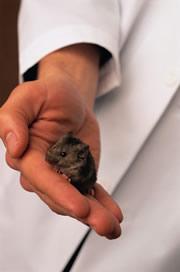 Testing times: how should researchers document what lab animals go through?© Getty
Testing times: how should researchers document what lab animals go through?© GettyBritain could soon overhaul its regulations on how research that uses animals is reported. The proposed new measures aim to give the public a better understanding of exactly what pain and suffering lab animals experience throughout their lives.
At present, licence-holders for animal research are required to state, in advance, the degree of suffering that an 'average' animal will experience during the course of a given study. But many feel that this does not give a clear picture of what is actually happening.
Under the new system, scientists who use animals would be required to report retrospectively on the severity of adverse effects experienced by individual animals in their labs, says David Smith, president of the Laboratory Animal Science Association and chairman of the group that has developed and tested the new scheme by request of the government.
Information about animal research has never been a secret: the data are available from the government, although the names of researchers involved are not disclosed for security reasons. The new policy should simply make the information easier to access and understand, says Smith.
Britain has proven a hotspot for protests against such research; proponents of animal research recently launched their own campaign to raise awareness about the importance of testing (see 'Demo backs animal lab in Oxford').
Double measures
The degree of animal suffering is currently rated simply using the categories 'mild', 'moderate', 'substantial' and 'unclassified' (mostly procedures performed under general anaesthetic).
The new protocol will use the same scale, but researchers will report the maximum degree of suffering during the study and the duration for which it is experienced, along with the severity over the remainder of the procedure.
This provides a more precise picture of events, says the team. The breeding of transgenic mice, for example, involves a vasectomy for male mice that causes initial discomfort. But this is followed by a relatively normal year of living and mating with little trauma at all, notes Dominic Wells of Imperial College London, UK, a member of the research team.
The group hopes to introduce the system, after further trials, within a few years. Policy-makers are keen to stress that the process will only become law if it does not bury researchers under unreasonable amounts of red tape.
Smith's group has quizzed 168 licence-holders on the experience of their animals during a range of research projects. They found that 90% of researchers carrying out 'moderate' or 'substantial' procedures already keep sufficient notes as a matter of course to allow them to make a retrospective report.
Up to date
ADVERTISEMENT
Other countries, such as Switzerland, The Netherlands and New Zealand, have also considered retrospective reporting as a way to increase public awareness of animal-research procedures.
"Science is constantly developing, and it is important that regulations are kept up to date," says UK Home Office minister Andy Burnham.
"Although it is too early to say exactly what form this re-evaluation of procedures will take, any attempt to better understand the life experience of animals in the lab is to be welcomed," adds Vicky Robinson, chief executive of the London-based National Centre for the Replacement, Refinement and Reduction of Animals in Research, UK.
Visit our reportingset_f.html">newsblog to read and post comments about this story.
Imperial College, London
